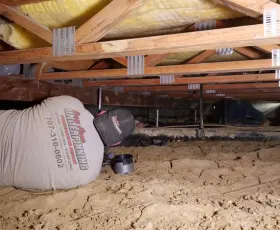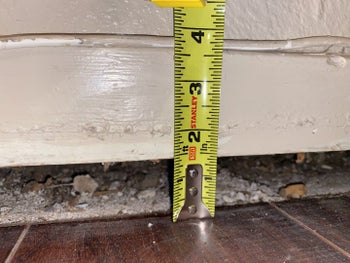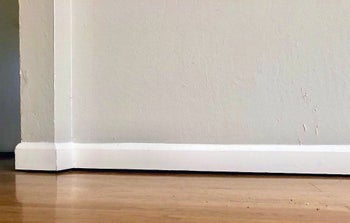What is Floor Slope?
Table of Contents
1. What Is Floor Slope?
2. What Causes A Sloped Floor?
3. Should You Worry About A Sloped Floor?
4. How Are Sloped Floors Repaired?
5. How To Prevent Floor Slope
A sloping floor might seem fun if you enjoy skateboarding, but it has no place in your home.
This is actually a sign that your home and its foundation are suffering from damage. The longer it goes unrepaired, the more problems your home will experience. It also jeopardizes your family’s safety.
Still curious what floor slope is and why it’s happening in your home? If so, don’t hit that back button because you’ve landed on the right page. In this article, we’ll review floor slope, what causes it, how local foundation repair professionals like Bay Area Underpinning fix floor slope, and more.
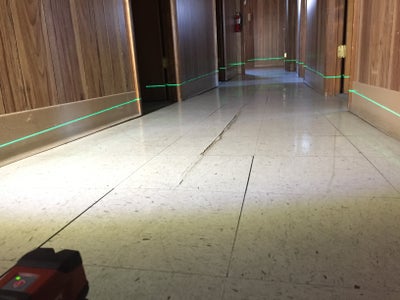
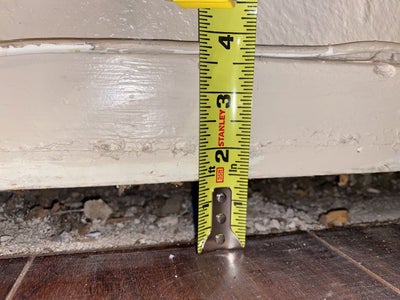
What Is Floor Slope?
Floor slope measures the angle at which a floor is inclined or tilted. It’s usually measured in degrees or inches per foot.
You’ll often notice a gap between the wall and flooring, which you can see here. Not all sloping or uneven floors may be as noticeable, however. Sometimes, the slope may be minimal but enough to impact your home.
What Causes A Sloped Floor?
The two leading causes of floor slope are differential foundation settlement and trouble in the crawl space (if you have a crawl space foundation).
Let’s take a closer look at each one.
1. Differential Foundation Settlement
Floor slope can be a sign of differential foundation settlement. Differential foundation settlement occurs when a foundation settles into the ground unevenly. Differential foundation settlement can be a serious issue for buildings because it stresses the structure and can lead to structural damage.
Causes Of Differential Settlement
Some common causes of differential settlement include the following:
- Inadequate soil preparation – Inadequately compacted soil can shift and settle unevenly over time. This can lead to differential settlement and structural damage.
- Expansive soil – Expansive soil contains a lot of clay; because of this, it expands and contracts as it absorbs and releases water. This creates movement under the foundation and can cause differential settlement.
- Extensive digging next to the foundation – If your neighbor carries out heavy excavation next to your house, it could disturb the soil under the foundation leading to differential settlement.
- Weather changes – An example of this would be building a house on expansive soil during a drought. When the drought ends and the soil begins to absorb moisture, it will expand by quite a bit and push up on the foundation. This could lead to differential settlement.
- Seismic activity – It will likely come as no surprise that earthquakes cause the soil to shift and move, leading to uneven settling of the foundation and potential structural damage.
Signs Of Differential Settlement
Along with sloped floors, other signs your home might be experiencing differential settlement include:
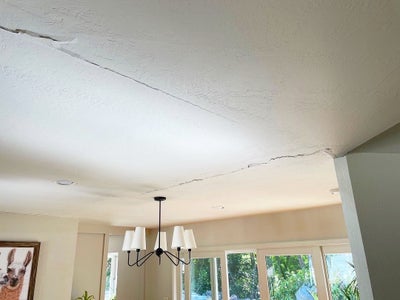
- Cracks in walls, floors, and ceilings
- Stair step cracks in brick or masonry
- Torn wallpaper (The wall behind the wallpaper might be cracked.)
- Drywall cracks or nail pops
- Sticking windows and doors
- Moldings that have separated from the wall or ceiling
If you see any of the above symptoms – or anything else that looks suspicious – contact a foundation repair contractor like Bay Area Underpinning immediately and ask for an evaluation.
2. Trouble In The Crawl Space
In a crawl space foundation, floor slope can also be caused by trouble with the wooden structures in the crawl space.
Causes Of Trouble In The Crawl Space
This might be support posts that have become non-vertical, deteriorated joists or beams, or something else.
Excessive moisture and pests (like termites) are common culprits that attack wooden supports, weakening them, and leading to sloping floors.
Signs There’s A Problem In The Crawl Space
Besides sloping floors, common signs there’s a problem with the wooden structures in the crawl space include:
- Bouncy floors
- Furniture that shakes when you walk by
- Musty smell (This could indicate moisture in the crawl space.)
- Mold on the wooden floor or baseboards above the crawl space (This could mean mold in the crawl space.)
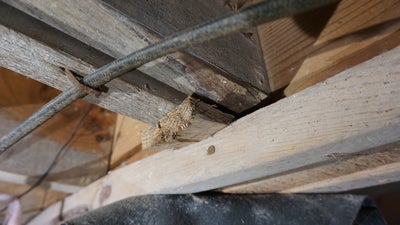
Should You Worry About A Sloped Floor?
You should worry about a sloped floor because it could signify a serious foundation problem. If you notice a sloped floor in your home, it’s essential to have it evaluated by a foundation repair professional. They can determine the cause and recommend the best course of action. Sometimes, a sloped floor can be fixed with relatively simple repairs, while it may require more extensive work in other cases.
How Are Sloped Floors Repaired?
The repair solution for a sloped floor will depend on the cause. If the sloped floor was caused by differential settlement, the solution will probably be underpinning using push piers or helical piers. If a problem in the crawl space caused the sloped floor, the answer might be crawl space jacks.
Underpinning
Underpinning involves using foundation piers (push or helical) to extend the foundation to load-bearing soil. The general installation procedure for push piers is as follows:
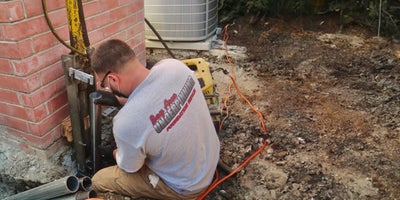
- The soil around the foundation perimeter is excavated down to the footing.
- Steel brackets are attached to the footing.
- The push piers are driven through the brackets and into the ground beneath the foundation until they reach load-bearing soil.
- After the piers are load tested to ensure they can support the foundation, a synchronized hydraulic lifting system raises the foundation to maximum practical level, which means the foundation is raised as much as possible without causing damage.
- After the piers have been installed, the excavated soil is replaced.
Installing Crawl Space Jacks
If the sloped floor was caused by deteriorated support posts in the crawl space, a common repair solution is to remove the deteriorated posts and replace them with adjustable crawl space jacks. Once the jacks are in place, the floor can be lifted and leveled.
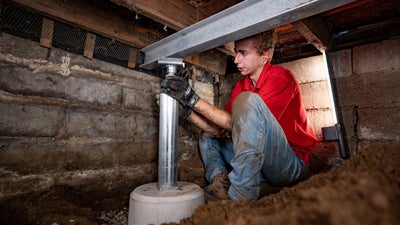
How To Prevent Floor Slope
Since most foundation problems are caused by excess moisture in the ground around the foundation, homeowners can go a long way toward preventing trouble by getting groundwater under control. Here are some ways to do that:
- Regrade the yard around the foundation – Regrading the yard around the foundation means shaping the soil so it slopes away from your home. This will prevent groundwater from draining toward the house and pooling around the foundation. The ideal slope is 6 inches of drop for every 10 feet of horizontal distance.
- Clean your gutters regularly – Clogged gutters can cause water to overflow and soak the ground around the foundation. Be sure to remove dead leaves and debris from your gutters at least twice a year.
- Install downspout extensions – Downspout extensions are inexpensive, easy to install, and will direct runoff away from the foundation before release.
- Install a drain tile system – A drain tile system is an excellent way to prevent excess moisture from building up in the ground around the foundation. It consists of a buried perforated drainage pipe that collects excess water and directs it away from the foundation.
- Keep large trees away from the foundation – Large tree roots can “drink” a lot of water from the soil, causing voids to form under the foundation. If the foundation settles into these voids, it could result in differential settlement.
If you’re concerned about the floor slope in your Northern California home, contact our team at Bay Area Underpinning today to schedule a free foundation inspection. We’ll evaluate your home and provide you with a no-obligation estimate for customized repair solutions.
More Resources
Publish Date:
Last Modified Date:
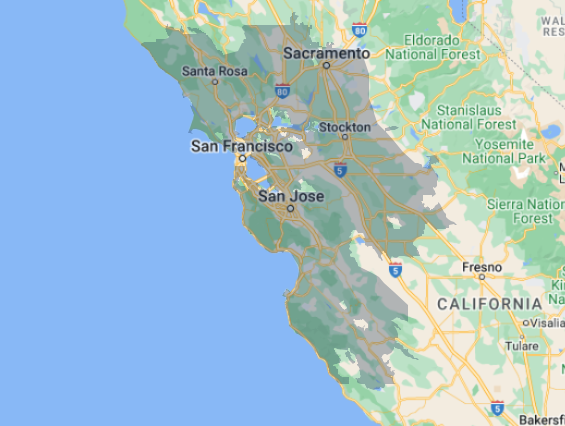
Our Locations
2333 Courage Dr. Suite C
Fairfield, CA 94533
1161 N Fair Oaks Ave
Sunnyvale, CA 94089

